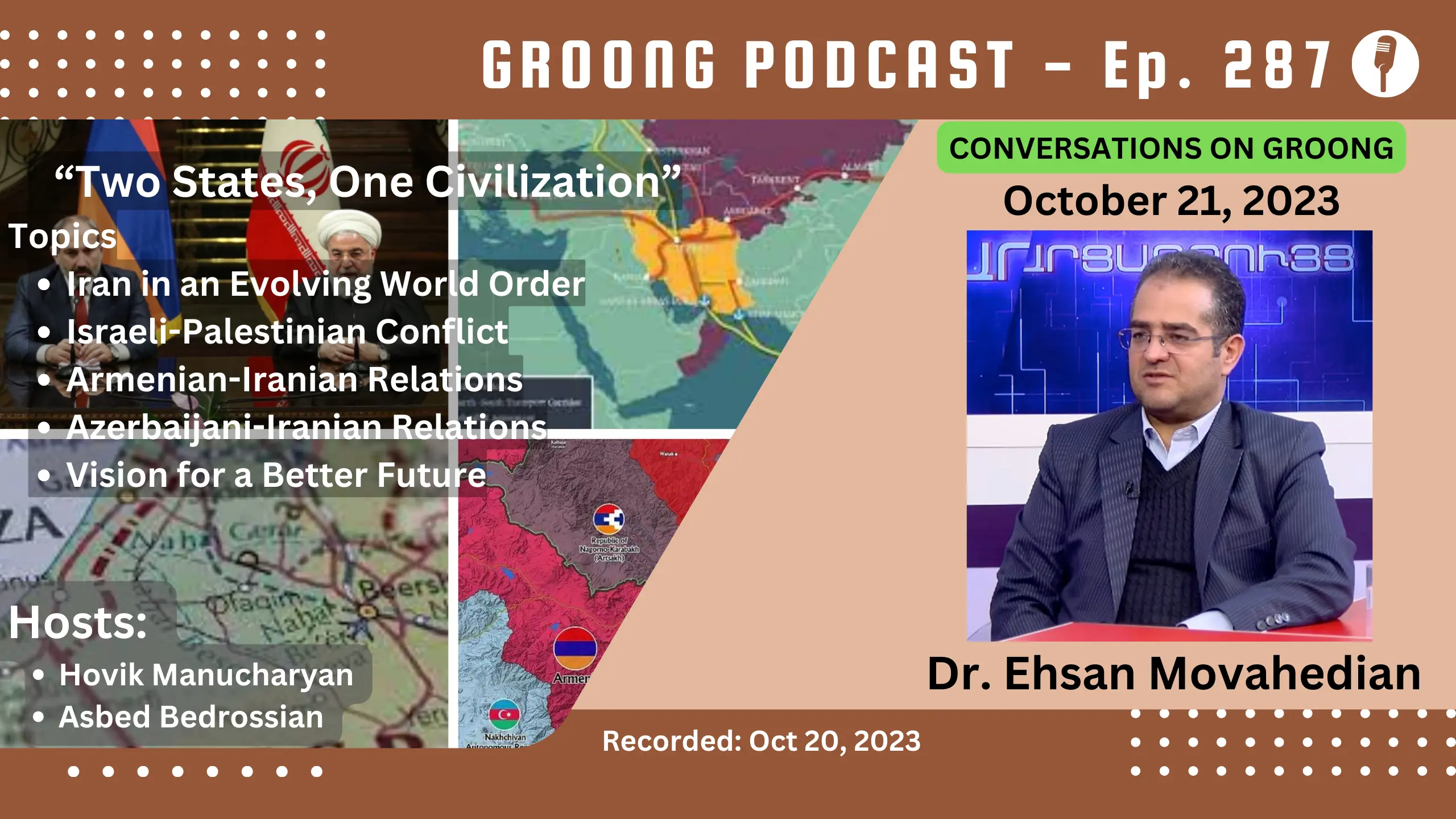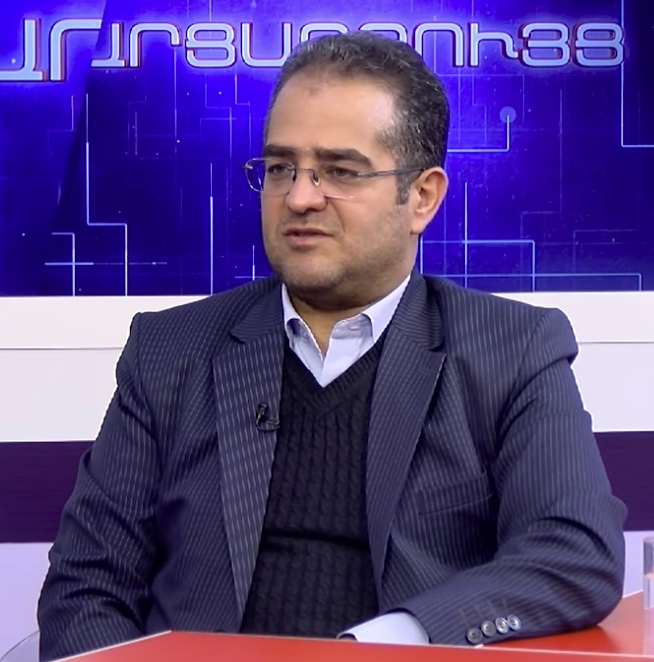
Guest:
Topics:
- Iran in an Evolving World Order
- Israeli-Palestinian Conflict
- Armenian-Iranian Relations
- Azerbaijani-Iranian Relations
- Vision for a Better Future
Episode 287 | Recorded: October 20, 2023
Show Notes
Global Multipolarity Shifts
Many experts are calling the current period of turmoil and upheaval in the world, to be the ending of the post-Soviet era, and the world reordering from a unipolar one, back to a multipolar order, especially with the emergence of China and India and their increasingly assertive and dominant presence on the world stage.
Question:
- How are the regional and global geopolitical shifts changing Iran’s relations with the world, as well as its region?
A few months ago there was the surprise revelation of a thaw in Saudi-Iranian relations, under Chinese auspices. This caught most of the West by surprise.
Question:
- Should we view this shift within the context of Iran’s global realignments? How does Iran see its strategy evolving in the Middle East and also towards Turkey?
Israeli-Palestinian Conflict
Probably the biggest foreign policy headache for Iran right now is the Israeli-Palestinian conflict.
For decades Iran has championed the rights of the Palestinians to become a state, and be represented in the United Nations. But in the past few years the Palestinian Cause had all but disappeared from the agenda of the Middle East.
Questions:
- What were the causes for this recent ignition of the all-out hostilities in Israel? It seems like it caught even the intelligence community by surprise and exploded out of nowhere.
- Iran’s FM went to Syria and Lebanon last week, as the conflict spread. What were Iran’s main objectives for his visit?
In the past few years various Arab countries have been negotiating and signing bilateral agreements with Israel, without even the mention of the Palestinian cause. Prime ongoing example being the US-promoted Saudi Arabian-Israeli so-called “Normalization”.
Question:
- How does the current conflict affect these negotiations or agreements?
- Is Iran supportive of such agreements?
Armenian Iranian Relations
Iran’s Reaction to 44-Day War Outcome
The Armenian defeat in the 44-day war in Artsakh (Nagorno Karabakh) in 2020 seems to have shifted Iran’s foreign policy towards the South Caucasus from a long term, passive mode, to an increasingly active state of affairs. Prior to 2020, for almost 3 decades, Iran had enjoyed a quiet and peaceful border with Armenia and Artsakh.
Such peace is fundamentally based on trust.
Questions:
- What was the source of trust between Iran, Armenia, and Artsakh?
- Was Iran unprepared for an Armenian defeat in 2020? Was such an outcome not planned for in Iran’s scenarios of regional crises?
- How do the consequences of the 44-day war matter for Iran?
Position on Artsakh
As we know of course, three years after the 44-day war, Aliyev’s and Pashinyan’s policies have led to the catastrophic ethnic cleansing of Artsakh from its indigenous Armenian population.
Questions:
- How would you summarize, or characterize, Iran’s policy towards Artsakh, from the times when there was a de facto government there, through the war in 2020?
- How concerned is Iran that Israel is leveraging its alliance with Azerbaijan, to install itself right on its borders?
Armenia’s Pivot to The West?
The current policy of the Armenian government appears to be shifting away from a partnership with Russia towards a deeper integration with the EU and the West. Most recently in Strasbourg, Pashinyan said: “The Republic of Armenia is ready to be closer to the European Union, as much as the European Union considers it possible.”
Armenia has also invited European observers to monitor the border with Azerbaijan, claiming this as an important part of its efforts to secure peace with Azerbaijan. Russia views the Armenian government’s so-called “peace agenda” with suspicion. Iran has also previously issued statements that only regional countries should be involved in solving regional geopolitical problems?
Questions:
- How does Iran perceive Armenia’s potential pivot to the west, as perhaps manifested through the presence of EU monitors in Armenia?
- Iran has made multiple proposals to Armenia, to jointly secure its Syunik region. Armenia doesn’t seem to be taking the extended hand. How is this received in Iran?
Iran’s Red Lines
Azerbaijan and Turkey have repeatedly indicated that they want to change the borders in the South Caucasus, by force, if necessary, to their advantage. While Russia has made some statements that it disagrees with border changes and says the right things about Armenia’s sovereign territory, everyone knows that it has been Iran’s very powerful and repeated messaging, that encroaching on Armenia’s borders will cross Iran’s “Red Lines”.
Questions:
- What are the key Iranian national interests in the South Caucasus in general?
- What do Iran’s “Red Lines” mean? Does it mean Iran will engage militarily? Under what circumstances?
Soft Power
Just this past February, Iran stated that it’s targeting bilateral trade with Armenia at the level of $3 billion per year. It went up sharply in 2022, but it’s still under half a billion a year.
Questions:
- It’s been over 30 years since Armenia’s independence and Armenia as part of the EAEU represents a large market for Iranian products. Why aren’t the two neighbors trading in the many billions already? What are the stoppers?
- What can be done to increase economic ties between Iran and Armenia? What major hurdles should be removed?
- What about other communications, such as the electricity grid, energy pipelines?
- In the early 2000s Russia sought to narrow the diameter of the gas pipeline between Iran and Armenia out of concern that this could then be exported to Europe and compete with Russia. Do such concerns remain current among Russian policymakers?
Especially after the war in Ukraine, Russia is very much interested in communication lines that avoid the Black Sea. For some Russian policy makers, the Ashtara-Rasht-Qazvin railway project (part of the International North–South Transport Corridor) is of strategic importance. Iran also seems to be very cooperative with Russia on INSTC and other regional projects. However, all the primary communication routes for these regional projects seem to bypass Armenia. For instance, it seems there is little financial incentive or geopolitical interest to fund new rail corridors that would connect Iran to Russia and Europe, avoiding Turkey or Azerbaijan, and specifically going through Armenia and Georgia.
Question:
- Has Iran reconciled with the current reality that to connect with Russia it must go through Baku, especially when it comes to rail, or is it purely economically driven?
Azerbaijani Iranian Relations
Despite all superficial statements by both Iran and Azerbaijan, there is deep distrust between the two countries.
Questions:
- What are the fundamental causes for this distrust?
There are millions of ethnic Azeris in the north of Iran. Provocatively, Ilham Aliyev has started calling these lands South Azerbaijan, and the people South Azerbaijanis.
Questions:
- Where is this headed?
- How do ethnic Azerbaijanis in Iran feel towards independent Azerbaijan?
Vision for a Better Future
Given its resources, Iran should be a major and wealthy power. But ever since the revolution in 1979, Iran has lived under one regime of “western sanctions” or another.
Question:
- From Iran’s perspective, what are the reasons for this, and what is Iran’s strategy for exiting this lifestyle of western sanctions?
Wrap-up
All right, that’s our show, we hope you found it useful. Please find us on Social Media and follow us everywhere you get your Armenian news, the links are in the show notes. Thanks to Laura Osborn for the music on our podcasts. We’ll talk to you soon!
Guests

Ehsan Movahedian
Dr. Ehsan Movahedian is an International Relations specialist, ATU University, in Tehran, Iran. He focuses on multidisciplinary research about Digital Diplomacy and politics.
Hosts

Asbed Bedrossian
Asbed Bedrossian is an IT professional, and for years oversaw the central IT enterprise infrastructure and services at USC. His decades of experience spanned across IT strategy, enterprise architecture, infrastructure, cybersecurity, enterprise applications, data center operations, high performance computing, ITSM, ITPM, and more.
Asbed founded the Armenian News Network Groong circa 1989/1990, and co-founded the ANN/Groong podcast in 2020.

Hovik Manucharyan
Hovik Manucharyan is an information security engineer who moved from Seattle to Armenia in 2022. He co-founded the ANN/Groong podcast in 2020 and has been a contributor to Groong News since the late 1990s.
Disclaimer: The views expressed by Hovik Manucharyan on the ANN/Groong podcast are his own and do not necessarily reflect the opinions of his employer or any other organization.